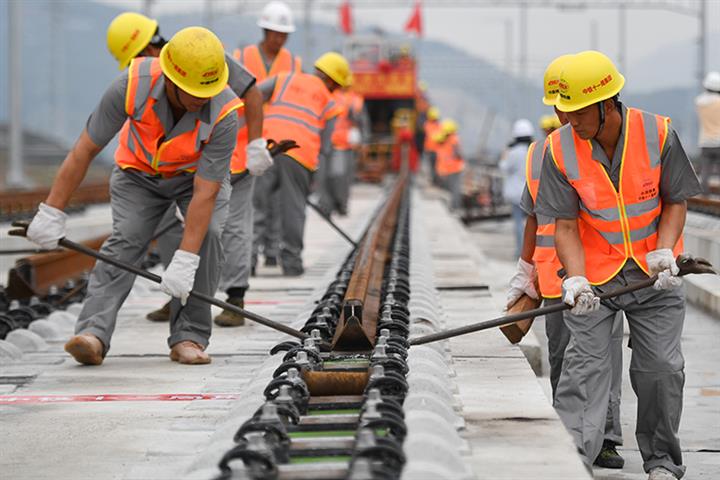 Tracks Are Laid for China's First Non-State-Owned High-Speed Railway Ahead of 2021 Launch
Tracks Are Laid for China's First Non-State-Owned High-Speed Railway Ahead of 2021 Launch(Yicai Global) June 25 -- The Hangzhou-Shaoxing-Taizhou route, China's first high-speed railway controlled by private capital, is expected to start operations by December after finishing laying tracks earlier this week.
The nearly 267-kilometer railway in eastern China should cut the journey from Jiangsu province's Taizhou to Hangzhou by half to about one hour.
The project broke ground in late 2017 with an expected investment of about CNY40.9 billion (USD6.3 billion), according to public data. A consortium led by Shanghai-based conglomerate Fosun International has a 51-percent stake in the undertaking. State-owned China Railway holds 15 percent of the equity. Local governments have the remainder.
Slim Profits
Private capital is not often seen in railway projects in China as profit outlooks can seem meager.
Most of China's high-speed railway projects are in the black but the profits are not very big, a senior executive at a Chinese rail transit firm told Yicai Global.
Only major lines with huge passenger flows such as the one between Beijing and Shanghai, as well as the Guangzhou-Shenzhen-Hong Kong Express Rail Link achieve larger profits, Zeng Gang, head of East China Normal University's Institute of Urban Development, told Yicai Global in an interview.
But this time, the leading investor may have some fresh ideas. Fosun, with rich resources in various sectors such as logistics, health, real estate, commerce, and internet, will make full use of these advantages in railway transport, said Chairman Guo Guangchang. The market has huge space for imagination, he added.
The Hangzhou-Shaoxing-Taizhou project is based on a build-operate-transfer model. This means that after four years of construction, investors will operate the project for 30 years, after which they will hand over the assets to the government, an executive at Fosun said to Yicai Global earlier.
Those 30 years should be used wisely. Private firms can relieve regional governments' financial pressures by introducing innovative profit models, said Zeng.
But the solution is probably not hiking ticket prices. High-speed railway operators cannot rely on ticket sales, according to the above-mentioned senior executive. Instead, the firms need to make use of their commercial assets such as shops and advertising space, the person added.
Transport companies can combine real estate and tourism business at the stations that are usually located outside downtown areas to unleash bigger economic effects, the executive added.
Editor: Tang Shihua, Emmi Laine, Xiao Yi